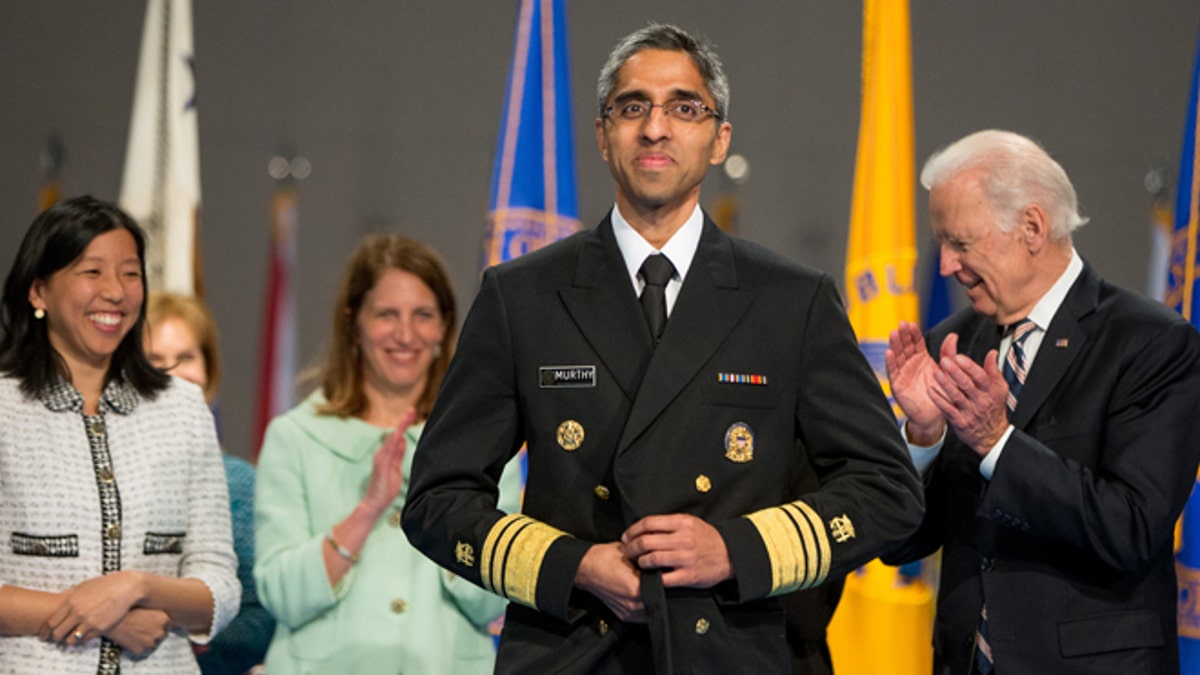
April 22, 2015: Alice Chen, left, Health and Human Services Secretary Sylvia Burwell, second from left, and Vice President Joe Biden, right, stand with U.S. Surgeon General Vivek Murthy, center, after he is ceremonially sworn-in in Conmy Hall at Fort Myer in Arlington, Va. Chen is the fiancé of Murthy. (AP Photo/Andrew Harnik)
Dr. Vivek H. Murthy became the 19th and, at 37, the youngest surgeon general of the United States in April. He is a physician with a brilliant resume and a vice admiral in the public Health Service Commissioned Corps. And, like me, he is an Indian-American, someone I want to be immensely proud of.
So I wish my colleague in medicine would try to remember that he’s a doctor, not a politician.
Gun violence isn’t a medical issue. It’s a political issue. The medical issue is the precursor to gun violence: mental health. That’s what the surgeon general should focus on.
Murthy almost didn’t become “America’s doctor.” President Obama nominated him for the post in November 2013, but it didn’t take long for a tweet he’d written 13 months earlier to surface. The tweet read, “Tired of politicians playing politics w/ guns, putting lives at risk b/c they're scared of NRA. Guns are a health care issue.” – words that predictably raised the hackles of the National Rifle Association and U.S. senators on both sides of the aisle.
Gun violence isn’t a medical issue. It’s a political issue. The medical issue is the precursor to gun violence: mental health. That’s what the surgeon general should focus on.
Without a change in the Senate’s filibuster rules, Murthy’s nomination would not have come to a vote. And even after the change, he barely squeaked in, 51-43, with the support of only one Republican senator. Murthy himself noted in his remarks last month at his confirmation in Fort Myer, Va., that “even after being nominated for this job by a president I deeply admire, I almost didn’t get to be your surgeon general.”
So wouldn’t you think Murthy would have figured out by now that politics and medicine aren’t always a good mix, and that some things are better left unsaid?
I certainly would. And that’s why my jaw dropped when Murthy, in that same confirmation speech, brought up the subject of “health equity.” It was the wrong subject at the wrong place at the wrong time. All it did was get our surgeon general off to a bad start in his new job.
Health equity is a loaded term. The Centers for Disease Control and Prevention defines it as when everyone has “the opportunity to ‘attain their full health potential’ and no one is ‘disadvantaged from achieving this potential because of their social position or other socially determined circumstance.’” Its bad brother is health inequity, which is defined as “a difference or disparity in health outcomes that is systematic, avoidable, and unjust.”
Let’s face it … There are disparities in health care, and they need to be studied and better understood. But “health inequity” refers to disparities of race and socioeconomic status. You have to be very careful about using that term, because it really is not something we medical practitioners can fix.
What we can deal with is a whole different issue with a similar name: Health Inequality, which the CDC defines as the “differences, variations and disparities in the health achievements of individuals and groups of people.” We know, for example, that African-Americans are more prone to stroke, that light-skinned whites are more prone to skin cancer, that some genetic diseases are more prevalent among certain demographics. Health inequality is something the surgeon general can and should focus on. Discussing health inequity, on the other hand, is like spraying gasoline on a fire. It creates the appearance that you’re more concerned about socioeconomic status than public health.
Murthy was right when he said health equity is a civil rights issue – and that’s exactly why he shouldn’t have said it. Civil rights issues are better left to our politicians. They’re not the surgeon general’s job.
And Murthy does know his job. He alluded to it in his speech when he said:
Today, we face a rising tide of diabetes, heart disease and cancer. We will lose nearly half a million lives this year to tobacco-related disease.
Forty-two million people in our country struggle with mental illness.
Heroin and prescription drug abuse ravage towns across America, and vaccine-preventable diseases we thought we had contained have come back with a vengeance because of fear and misinformation.
That’s Murthy’s job. Having said that, he should have smiled for the camera, shaken Vice President Joe Biden’s hand and left the stage to get to work. Because what followed left me wondering if he wanted to be the surgeon general or the secretary of homeland security:
Public health [is] intrinsically linked to education, employment, the environment and our economy. There is a whole world beyond hospital corridors and clinic waiting rooms where people are struggling with issues of transportation, housing and development.
The point is, we cannot effectively address the challenges before us until we treat health as a shared responsibility. That is why we have to build the great American community.
Building the great American community? When did that become the surgeon general’s job?
And then, for good measure, Murthy doubled down on the politics in an interview published in a recently in the Washington Post, saying:
The statements I’ve made in the past about gun violence being a public health issue, I stand by those comments because they’re a fact. They’re a fact that nearly every medical professional who’s ever cared for a patient will attest to.
Will Murthy never learn? Gun violence isn’t a medical issue. It’s a political issue. The medical issue is the precursor to gun violence: mental health. That’s what the surgeon general should focus on.
Dr. Murthy, please … Be a doctor, not a politician.
